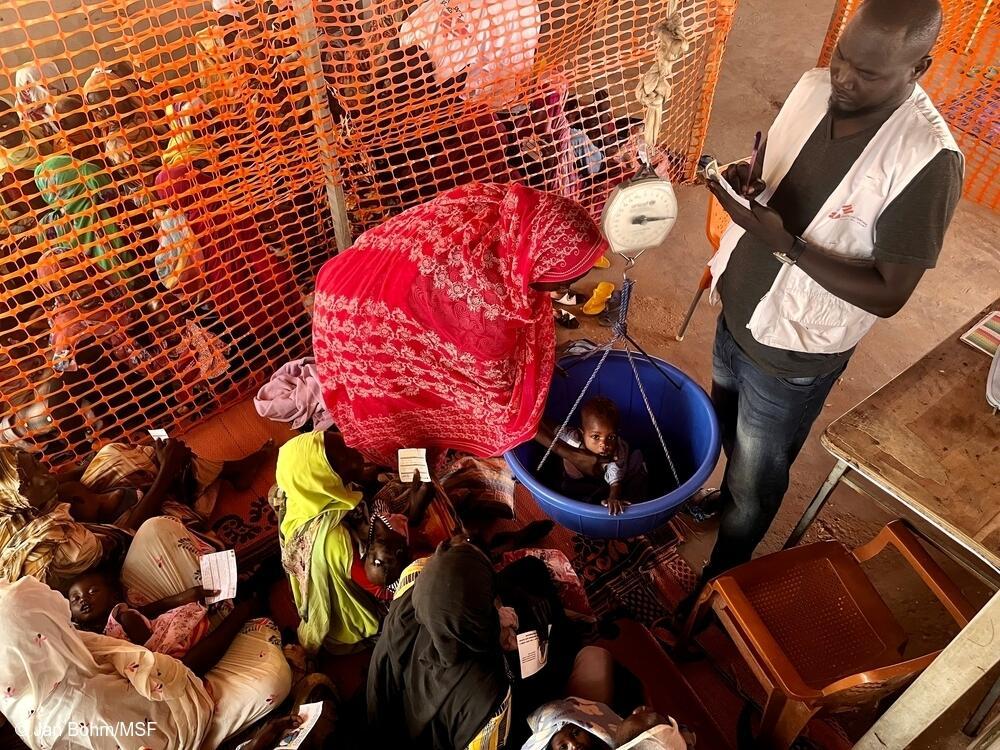17 November 2023 – The international humanitarian organisation Médecins Sans Frontières (MSF) is warning of the worrying nutritional status of Sudanese refugee children in eastern Chad as highlighted in a recent survey. This serious situation reflects the deprivation suffered by people who survived the horrific violence raging in Sudan and the additional efforts still required to provide an appropriate humanitarian response to their desperate situation, particularly in terms of emergency food aid, now that they are in Chad.
A rapid nutritional assessment implemented last month by MSF teams in the Metché camp which shelters approximately 40,000 people showed that 7.1% of children under the age of two years were suffering from severe acute malnutrition, and that the overall prevalence of acute malnutrition in children under the age of five was 13.6%. The survey MSF conducted between 7 August and 4 September indicated rates of 11.3% of global acute malnutrition in under five-year olds in the camp in Ourang and 11.6% in the camp in Arkoum, and severe acute malnutrition rates of 4.8% and 4.6% respectively. These percentages are well above the emergency thresholds established by the World Health Organisation. In concrete terms, this means that children who have survived the deprivation, unremitting attacks and extreme violence that have engulfed Darfur are now in alarmingly poor health.
“This is a serious nutritional situation that calls for considerably more nutrition and food aid,” says Mohammadou Gado, emergency coordinator in eastern Chad. “More financial, human and logistical resources must be allocated to emergency food aid so that the World Food Programme and its partners can continue to safely organise regular large-scale distributions including in 2024. They must ensure that the distributions reach families who are most at risk and that they’re adapted to the specific requirements of undernourished people, which means they must be enriched with vitamins and minerals," continues Mohammadou Gado.
Since the beginning of the year, MSF teams have treated around 14,000 malnourished children in outpatient programmes in Adré and in camps in the surrounding area. Close to 3,000 children suffering from malnutrition with complications had to be hospitalised in critical condition in Adré, 80% of them between June and mid-November following the massive arrival of refugees.
By all accounts, because they still don’t have ration cards, many vulnerable families with children in MSF’s nutrition programmes, reportedly do not have access to the distributions organised by the World Food Programme and its partners. The World Food Programme is also warning of the risks of having to restrict or stop some of its activities in Chad for lack of sufficient funding.
Survivors of the violence in Darfur are still fleeing to Chad, the country hosting the most Sudanese refugees. In addition to the 400,000 Sudanese refugees who had already crossed the border before this latest crisis, half a million people have arrived in the country since April 2023. Since the beginning of the month, the MSF team offering vaccinations and medical care at the main border post near Adré witnessed over 8,000 people forced to cross the border to escape the escalation in fighting between the Rapid Support Forces (RSF) and Sudanese Armed Forces (SAF) and reports of massive attacks against civilians in West Darfur capital El Geneina.
Most of the refugees are elderly, women or children. Lacking the necessary resources to support themselves, they are sheltering in towns in Chad already faced with severe food insecurity. The violence has meant that farmers in Darfur have not been able to cultivate their fields for months, agricultural production has contracted, and due to the increase in demand, food prices have skyrocketed in markets in east Chad. For example, the price of millet has shot up by 38% according to Fews Net. “During these particularly troubled and challenging times, communities in Chad sharing already inadequate access to water, arable land and essential services with recent and not-so-recent Sudanese refugees must also receive assistance” adds Mohammadou Gado.
